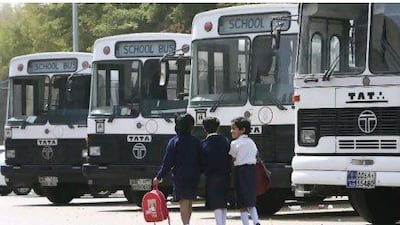SHARJAH // Police and school authorities have placed a ban on anyone with a criminal record driving a school bus.
The ban is part of a campaign to enhance safety and security. Drivers who have been in prison or convicted of any crime will be prevented from driving schoolchildren.
Other drivers will be required to obtain an additional driving permit in addition to their original operating licence.
"Every driver will have to undergo a one-week training, starting on November 14, to get this second licence," said Col Arif al Shamsi, the director of the Sharjah police traffic department. "The programme will aim to enhance the driver's skills, clarify how to deal with emergency situations and how to safely drop off and pick up students. From March 1 we shall be cracking down on non-trained drivers."
Buses have come under more scrutiny in response to a series of accidents, one of which resulted in the death of a child. Dubai's Roads and Transport Authority instituted 32 new regulations last September including specialised licences and speed regulators. The Ministry of Education said that all buses carrying primary school pupils would have to have supervisors on board to watch over them.
"Not all bus operators had safety measures in place, like putting up the stop sign," said ML Augustine, the managing director of Dubai's School Transport Services, which transports 48,000 students daily.
"Now they must conform to speed governance [and] everyone has uniform standards. It is compulsory."
Changes are also planned elsewhere in the Emirates. The Department of Transport announced in June that it would overhaul Abu Dhabi's school bus system. Though no details of the reforms were announced, the department said it would coordinate with bus companies, drivers, police and school regulators.
The Sharjah programme would come at a cost to prospective drivers, who will have to pay Dh500 to enter it. Police are expected to need three months to train all of the emirate's 3,000 registered school bus drivers. Authorities did not provide the number of current workers likely to lose their jobs for having criminal records.
Safety-related changes also extended to the types of vehicles used to transport students. Minibuses carrying 15 passengers will not be allowed as school buses and no licences will be given to their drivers, said Maj Khalid Ibrahim al Sharji, the training programme coordinator. There will also be no more approvals granted to rental-company buses or their drivers, he said.
School buses can carry 84 students maximum and must have two doors and a large mirror that shows children entering and leaving.
Though there must be a supervisor on board, opening and closing of doors will be controlled by the driver. The buses must be yellow with school names clearly marked and schools breaking the rules will be fined, Maj al Sharji said.
Mohammed Hussein, a bus driver with the Kamal private school, welcomed the rules, particularly those dealing with how to interact with students as he and his colleagues come into contact with numerous girls in the course of their duties.
"You know us drivers deal with students and some of them are girls," he said. "It's important for one to behave well and to be extra careful at work."
However, not all drivers were so supportive. A driver who preferred anonymity said they were already undergoing several training courses before starting their jobs and believed the newly mandated courses would only repeat what they already knew.
"I think it will make a lot of money for them," he said about the registration fees. "The careless drivers would continue having accidents after the programme."
Neglect has also been an issue. Aatish Shabin, aged three, died of an unknown illness after being left in a school bus overnight.
A year later, four-year-old Aiman Zeeshanuddin died of heat exhaustion and dehydration after being left behind in a private minibus hired by her parents to take her to school.
* With additional reporting by Ramola Talwar Badam

